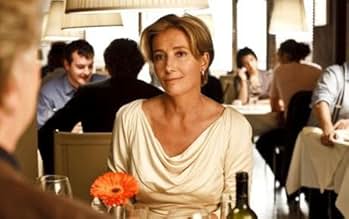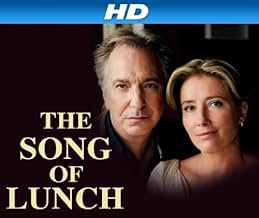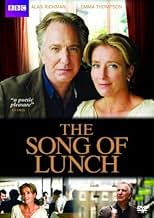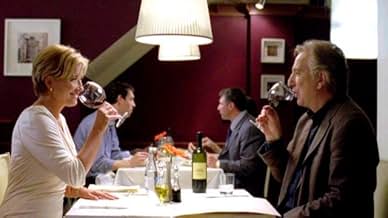The Song of Lunch
- Filme para televisão
- 2010
- 50 min
AVALIAÇÃO DA IMDb
7,3/10
2,7 mil
SUA AVALIAÇÃO
Adicionar um enredo no seu idiomaA London publisher recounts a lunchtime reunion with a former lover, in poetic monologue.A London publisher recounts a lunchtime reunion with a former lover, in poetic monologue.A London publisher recounts a lunchtime reunion with a former lover, in poetic monologue.
- Direção
- Roteiristas
- Artistas
- Indicado para 1 Primetime Emmy
- 4 indicações no total
Christian Wolf-La'Moy
- Advertising Guy Talking with Massimo
- (não creditado)
- Direção
- Roteiristas
- Elenco e equipe completos
- Produção, bilheteria e muito mais no IMDbPro
Avaliações em destaque
Combining the art of filmmaking and the art of poetry is extremely difficult, very complex undertaking for any director. It is much easier and with more opportunities to just film from a screenplay, where dialogue can flow with no absolute firm structure, do an actor can or director can change a word or two or more. No one can improvise working with a poem. Song of Lunch works like a fine waltz. Christopher Reid's poem is brilliant, as are Alan Rickman and Emma Thompson who dance his stanzas, as we hear them narrated by Rickman. The pacing of this film is so well done that we are are pulled in immediately and stay in pace up until the ending.
To all the Harry Potter nerds, Alan Rickman narrating for a whole 50 mins. In a film, what else do you need?
The song of Lunch is my recent find while browsing through the filmography of Emma Thompson. With run-time less than an hour, this TV movie is a poetic monologue of a struggling writer who's having a lunch date with his ex-lover. The whole movie shot from the POV of Rickman who's still obsessed with Thomson after all these years of their separation. Shot in an Italian restaurant on the streets of London where the two used to hang out while they were young, this drama clearly emphasizes on how the guy has remained stuck up to his long gone romantic venture while lady has moved on with her life and is there only for a formal reunion. The way he looks at her while drinking the wine and remembering the time they had together is a treat to watch.
If you like watching two people having random conversation, you will definitely like this.
The song of Lunch is my recent find while browsing through the filmography of Emma Thompson. With run-time less than an hour, this TV movie is a poetic monologue of a struggling writer who's having a lunch date with his ex-lover. The whole movie shot from the POV of Rickman who's still obsessed with Thomson after all these years of their separation. Shot in an Italian restaurant on the streets of London where the two used to hang out while they were young, this drama clearly emphasizes on how the guy has remained stuck up to his long gone romantic venture while lady has moved on with her life and is there only for a formal reunion. The way he looks at her while drinking the wine and remembering the time they had together is a treat to watch.
If you like watching two people having random conversation, you will definitely like this.
He came close to his fantasy, a renewal. But shortly let his mind take him down a trail of various sorts of negativity. He was on that line a bit, a line where he could have been witty and upbeat and challenging, a line he crossed into torpor and, well, annoyance, and more.
Or perhaps He knew something the other reviewers here (and they are a very solid group of reviewers) did not know: That She too wanted a renewal. Though her words bely that possibility, well into the film, she touches his hand in a way that is personal and perhaps a bit erotic. Perhaps in her wonderful life with a successful author and two nondescript kids, she would like to recoup her past with He.
Perhaps He knew this, and sabotaged it. If so, Why?
The subject that screenwriters love to chat about, subtext, comes up. I thought the Mamet fiasco, PHIL SPECTOR, had the characters all delivering subtext as dialogue. Thus there was no mystery. Here, however, the subtext was given us in his unspoken words, his thoughts, as voice-over dialogue in his own head. Perambulating in his skull. It worked.
For Rickman, I find this his second most compelling work, the first being CLOSET LAND (which I saw on a Saturday night in a popular movie theater, but only me in the room for that film). Both works exploit his rich voice.
Or perhaps He knew something the other reviewers here (and they are a very solid group of reviewers) did not know: That She too wanted a renewal. Though her words bely that possibility, well into the film, she touches his hand in a way that is personal and perhaps a bit erotic. Perhaps in her wonderful life with a successful author and two nondescript kids, she would like to recoup her past with He.
Perhaps He knew this, and sabotaged it. If so, Why?
The subject that screenwriters love to chat about, subtext, comes up. I thought the Mamet fiasco, PHIL SPECTOR, had the characters all delivering subtext as dialogue. Thus there was no mystery. Here, however, the subtext was given us in his unspoken words, his thoughts, as voice-over dialogue in his own head. Perambulating in his skull. It worked.
For Rickman, I find this his second most compelling work, the first being CLOSET LAND (which I saw on a Saturday night in a popular movie theater, but only me in the room for that film). Both works exploit his rich voice.
Christopher Reed's poem 'The Song of Lunch' is brought brilliantly to life here by Alan Rickman and Emma Thompson, two fine actors and, though like most actors they sometimes waste time (and make money, no doubt) in rubbish, here we see them both at the top of their games. Rickman has the harder role, since he also has to narrate the verse; but Thompson handles herself excellently opposite him, never attempting to claim a larger space than is available but filling what is there perfectly. The story is a classic male tragedy, of a drunken middle-aged man whose awareness of his own increasing unattractiveness is a self-fulfilling prophesy; but the observation and psychology are razor sharp, and the words clear and cutting. It could be thought a bold move to dramatise a poem; but with this level of quality at all levels, perhaps the success of this project was never really in doubt.
This film is not going to be for everyone. I knew that just five minutes in. But I loved it. The poem, the dialogue, the acting. Any lesser actors than these two could not have pulled it off. It is heartbreaking, because fairly early in, it becomes clear that someone has a problem and it is this issue, along with other feelings of inadequacy that is the true root of their relationship's demise. What is especially interesting is the fact that the viewer doesn't despise Rickman's character--rather, feels his humiliation and loss.
I gave the film eight stars rather than 10, because unresolved for me is the "WHY" of it. Why does he ask her to meet him for lunch to begin with? Is it to punish her? To rekindle something? Is the scene outside the apartment in Paris meant to illustrate obsession? Why does she agree to meet? Is she just being kind? If so--then why is she so cruel in her assessment of his book? The motivation/impetus for this lunch feels unclear to me.
I gave the film eight stars rather than 10, because unresolved for me is the "WHY" of it. Why does he ask her to meet him for lunch to begin with? Is it to punish her? To rekindle something? Is the scene outside the apartment in Paris meant to illustrate obsession? Why does she agree to meet? Is she just being kind? If so--then why is she so cruel in her assessment of his book? The motivation/impetus for this lunch feels unclear to me.
Você sabia?
- CuriosidadesThe photo on the dust jacket of the lead female character's husband's book is one of Greg Wise, Dame Emma Thompson's real-life husband.
- ConexõesFeatured in The Wright Stuff: Episode #14.45 (2010)
Principais escolhas
Faça login para avaliar e ver a lista de recomendações personalizadas
Detalhes
Contribua para esta página
Sugerir uma alteração ou adicionar conteúdo ausente




























